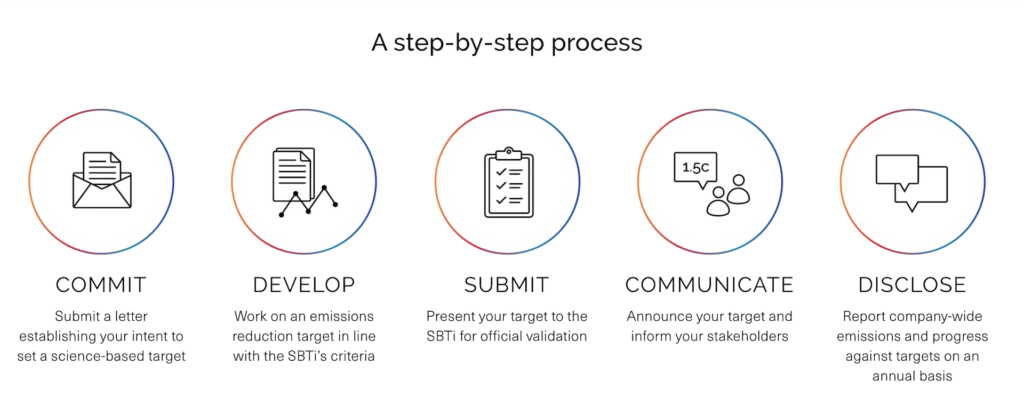Contact: +91 99725 24322 |
Menu
Menu
Quick summary: Discover the roadmap to setting Science-Based Targets (SBTs) and achieving sustainable carbon management. Explore key insights and strategies in our comprehensive blog, empowering businesses to drive positive environmental impact and navigate the path towards a greener future.

Setting science-based targets provides businesses to navigate the complex landscape and understand roadmap for sustainable carbon management. By aligning their carbon reduction efforts with climate science and global goals, organizations can drive meaningful change, enhance their competitive advantage, and contribute to a more sustainable future.
As the global community grapples with the urgent need to address climate change, businesses play a pivotal role in reducing greenhouse gas emissions and transitioning to a low-carbon economy. To ensure meaningful and effective action, setting science-based targets has emerged as a powerful tool for organizations to align their carbon reduction efforts with climate science and contribute to global sustainability goals. This article explores the importance of setting science-based targets and provides a roadmap for businesses to embark on a sustainable carbon management journey.
Setting science-based targets is essential for several reasons. Firstly, it ensures that organizations are taking real and measurable actions to address their carbon emissions in line with scientific consensus. By aligning their targets with the latest climate science, businesses can contribute to a collective effort to avoid catastrophic climate impacts. This commitment to science-based action enhances their credibility and positions them as responsible corporate citizens.
Also, science-based targets drive innovation and foster resource efficiency within organizations. When businesses set ambitious targets, it pushes them to explore new technologies, practices, and business models that can significantly reduce their carbon footprint. This drive for innovation not only helps in meeting the targets but also creates opportunities for cost savings, improved operational efficiency, and enhanced competitiveness.
Furthermore, science-based targets enable organizations to effectively navigate regulatory risks and changing market dynamics. As governments and regulatory bodies implement stricter emissions regulations and carbon pricing mechanisms, businesses that have already set science-based targets are better prepared to comply with these requirements. By proactively addressing their carbon emissions, organizations can avoid penalties, reputational damage, and other potential risks associated with non-compliance.
Science-based targets (SBTs) refer to emission reduction targets set by companies or organizations that are aligned with the scientific understanding of climate change. These targets are based on the best available scientific research and aim to contribute to keeping global warming well below 2 degrees Celsius above pre-industrial levels, as outlined in the Paris Agreement.
Science-based targets are crucial for effective climate action and sustainable carbon management for the following reasons:
Setting science-based targets for carbon management is a critical step towards addressing climate change and ensuring a sustainable future. It enables organizations to align their actions with the best available science, contribute to global climate goals, and unlock numerous environmental, economic, and social benefits.

By following these steps, organizations can establish science-based targets for carbon management that are aligned with global climate goals. This approach ensures that organizations are taking meaningful action to reduce their carbon emissions in line with the scientific understanding of climate change.
SBTi involves wider adoption, increased ambition, and a focus on Scope 3 emissions and sector-specific approaches. It integrates with broader sustainability goals, embraces advancements in science, and responds to growing investor and stakeholder scrutiny.
The future of SBTs will likely see a greater focus on addressing Scope 3 emissions, which account for a significant portion of an organization’s carbon footprint but extend beyond their direct operations. Collaborative efforts and partnerships along supply chains will be crucial in driving emissions reductions throughout the value chain. Sector-specific approaches to setting SBTs may also emerge, acknowledging the unique challenges and emissions profiles of different industries. This tailored approach will ensure that targets are realistic and achievable within the specific context of each sector.
While challenges such as data collection, financial implications, and implementation barriers may arise, organizations can overcome them through robust data management systems, cost-effective strategies, stakeholder engagement, and collaboration. By addressing these challenges, organizations can effectively set and achieve SBTs, leading to improved operational efficiency, risk mitigation, and innovation.
Trace Carbon addresses the challenges associated with adopting SBTs.
Data Collection – The solution simplifies the process of data collection providing a user-friendly mobile app that enables organizations to gather relevant sustainability and carbon data from various sources. Automated data integration along with real-time monitoring ensures accurate and comprehensive data collection.
Data management – The solution offers a robust data management system that allows organizations to efficiently baseline, track and analyse their data, thereby ensuring effective measuring and monitoring of progress towards SBTs ensuring transparency and accountability.
Data Analytics – The advanced analytics and benchmarking capabilities helps companies identify cost effective strategies to reduce emissions, identify areas of improvement and suggest targeted actions to optimize resource efficiency with minimal cost.
Verification and Reporting- The DMRV tool ensures accurate verification and reporting of emission data. This helps companies to comply with reporting and auditing requirements and provides assurance to stakeholders that the organization is on track to meet its SBTs.
Stakeholder Engagement- The collaborative blockchain platform facilitates easy communication of sustainability goals, progress and achievements among stakeholders. This fosters transparency and trust.
TraceX’s sustainability and carbon management platform streamlines the adoption of SBTs, overcomes data related challenges and drives meaningful progress towards their climate targets. It empowers companies with the tools and insights needed to navigate the complexities of SBTs and achieve the long-term sustainability and carbon goals.
As the urgency and recognition of the need to address climate change continue to grow, the future of setting science-based targets will likely witness a widespread adoption across industries and sectors. Increasing numbers of companies, organizations, and governments are expected to commit to SBTs as a means to align their climate goals with the best available science and international climate agreements. This broader adoption will not only include large multinational corporations but also smaller businesses, municipalities, and non-profit organizations. The ambition of SBTs is also set to increase, with organizations aiming for more aggressive emissions reduction targets that go beyond minimum requirements. This heightened ambition will be driven by a shared global consensus on the need for bold climate action to mitigate the worst impacts of climate change.
Setting science-based targets (SBTs) provides a clear roadmap for organizations to navigate the complex landscape of carbon management and contribute to global efforts to combat climate change. By aligning their emission reduction strategies with the best available scientific knowledge and global climate goals, organizations can drive meaningful action towards a sustainable future.
The significance of SBTs lies in their ability to guide decision-making, enhance accountability, and foster credibility. They ensure that organizations are taking effective and measurable steps to reduce their carbon emissions in line with the urgency and magnitude of the climate challenge. SBTs also facilitate engagement with stakeholders, including employees, customers, investors, and communities, by aligning with their expectations for responsible and sustainable practices.
Looking ahead, the future of setting SBTs is promising. Ultimately, setting SBTs is a critical step in the journey towards a low-carbon and sustainable future, where organizations play their part in mitigating climate change and creating a resilient and prosperous world for generations to come.
